Key takeaways:
- Homelessness is often overlooked and associated with stereotypes, yet individual stories, like Sarah’s, emphasize the complex factors leading to it.
- Local charities play a crucial role in providing immediate assistance while fostering community connections and support.
- Volunteering brings personal challenges, including emotional toll and resource scarcity, but every effort, no matter how small, contributes to meaningful change.
- Personal interactions reveal resilience among those experiencing homelessness and highlight the importance of listening and human connection in driving change.
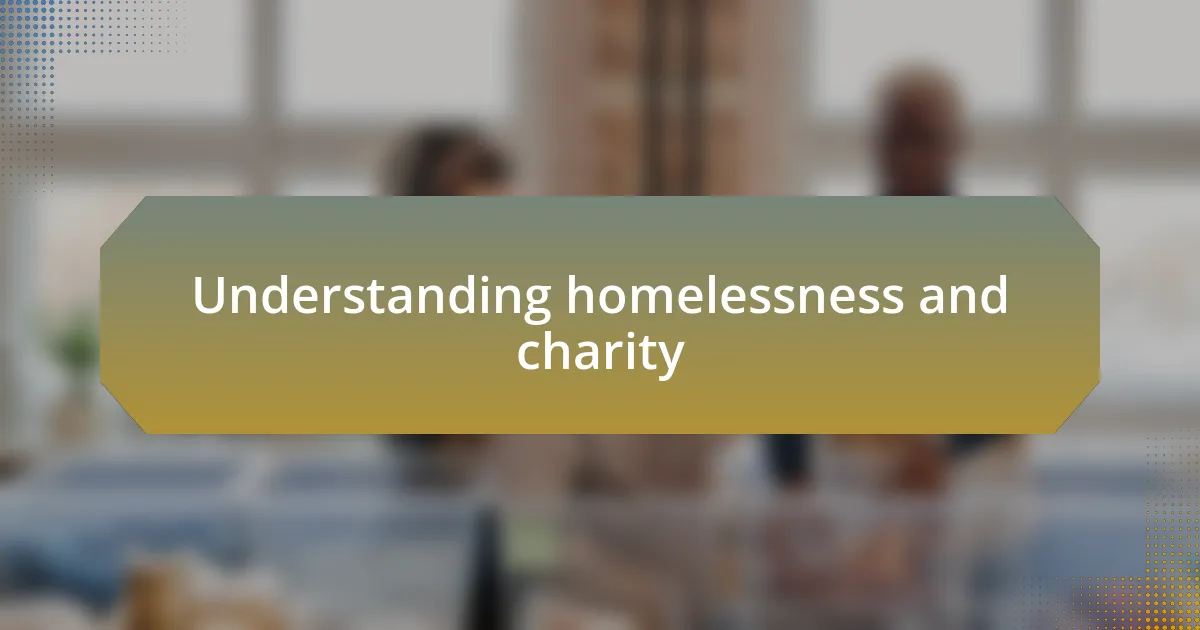
Understanding homelessness and charity
Homelessness is often misunderstood, reduced to statistics and stereotypes. I remember meeting a woman named Sarah at a local shelter who shared her journey from a stable job to living on the streets due to unexpected medical bills. How can such a quick turn of events happen in a society with so much wealth? It’s a stark reminder that circumstances affect us all differently.
Charity plays a critical role in addressing homelessness, transforming lives one act of kindness at a time. I recall volunteering at a food drive where I met several individuals who, despite their challenges, had dreams and aspirations. Isn’t it powerful to think that a simple meal could be the first step toward rebuilding someone’s hope?
Moreover, the relationship between homelessness and charity can be complex, often straddling the line between assistance and empowerment. I often reflect on the importance of not just providing immediate relief but also enabling long-term solutions. Are we merely putting a Band-Aid on a deeper issue, or can our efforts ignite change? It’s a question worth considering as we navigate this journey together.
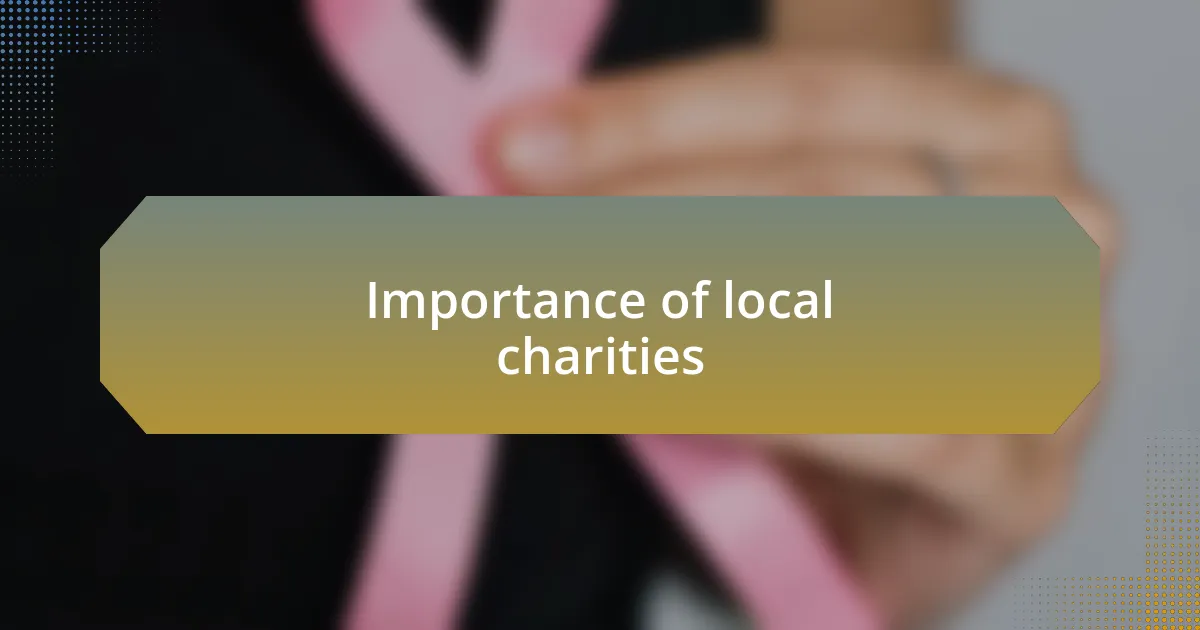
Importance of local charities
Local charities are vital components of any community, often serving as the frontline in the fight against homelessness. During my time volunteering at a food bank, I witnessed firsthand the impact of grassroots efforts. Each meal distributed didn’t just fill a stomach; it created connections and built trust within the community. How often do we overlook the power of these local organizations?
These charities not only provide immediate assistance but also foster a sense of belonging and support. For instance, I once helped organize a community event where individuals experienced the joy of sharing their stories. It struck me how a simple gathering could uplift spirits and instill hope. Isn’t it amazing how human connection can drive change?
Moreover, local charities often understand the unique needs of their communities better than larger organizations. They can tailor their services to address specific issues, which often goes unnoticed. I remember when a local shelter implemented job training programs based on feedback from its users. This approach gave many individuals the skills and confidence to regain their independence. Isn’t that what we should strive for—empowering people to create their own futures?
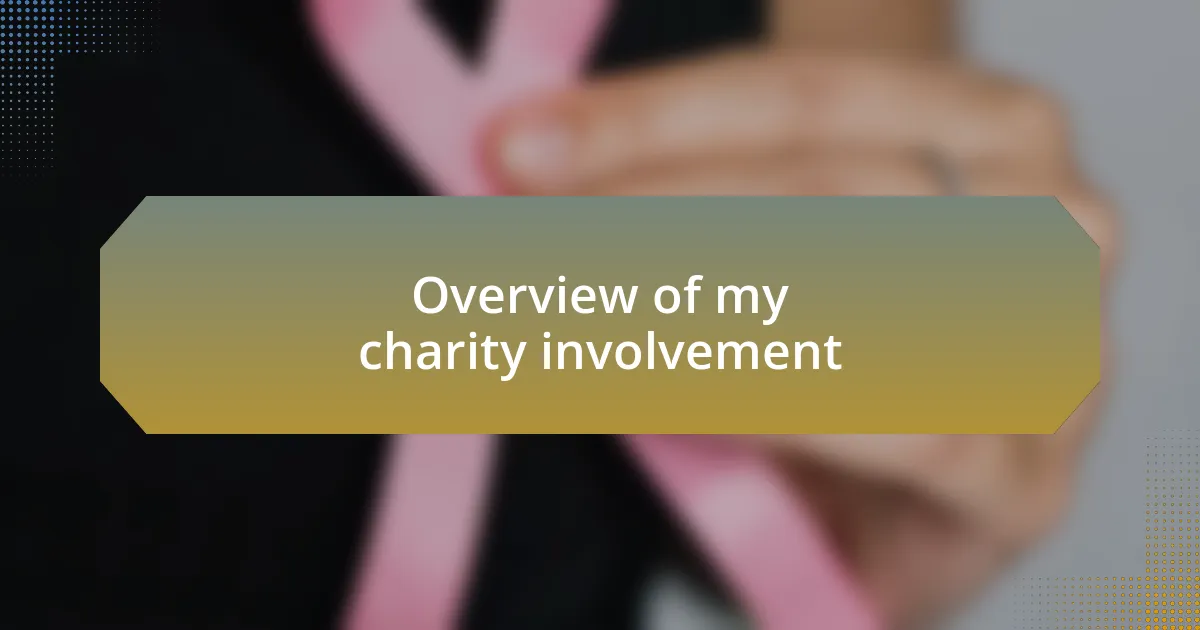
Overview of my charity involvement
Throughout my journey with a local charity, I’ve had the pleasure of wearing many hats—volunteer, organizer, and advocate. Each role has offered me unique insights into the struggles faced by individuals experiencing homelessness. I remember the time I served at a shelter’s overnight shift; the stories shared by residents were a stark reminder of their resilience, but they also revealed the profound isolation they endured. Doesn’t everyone deserve a safe space to belong?
One of the most impactful moments for me was when I helped launch a mentorship program aimed at young adults transitioning out of homelessness. I ran a couple of workshops focusing on life skills and job readiness. It was incredible to witness the growth of individuals who initially came in feeling defeated. Seeing someone land their first job after months of effort was a thrilling reminder that change is possible—don’t we all need a little encouragement to take that leap?
In addition to hands-on volunteering, I’ve committed my time to raising awareness about the issues surrounding homelessness within my community. I organized a series of fundraising events, and I vividly recall the heartfelt conversations with attendees who were initially unaware of the realities faced by unhoused individuals. It struck me how a campaign could open minds and inspire action. Isn’t it rewarding when awareness transforms into empathy and support?
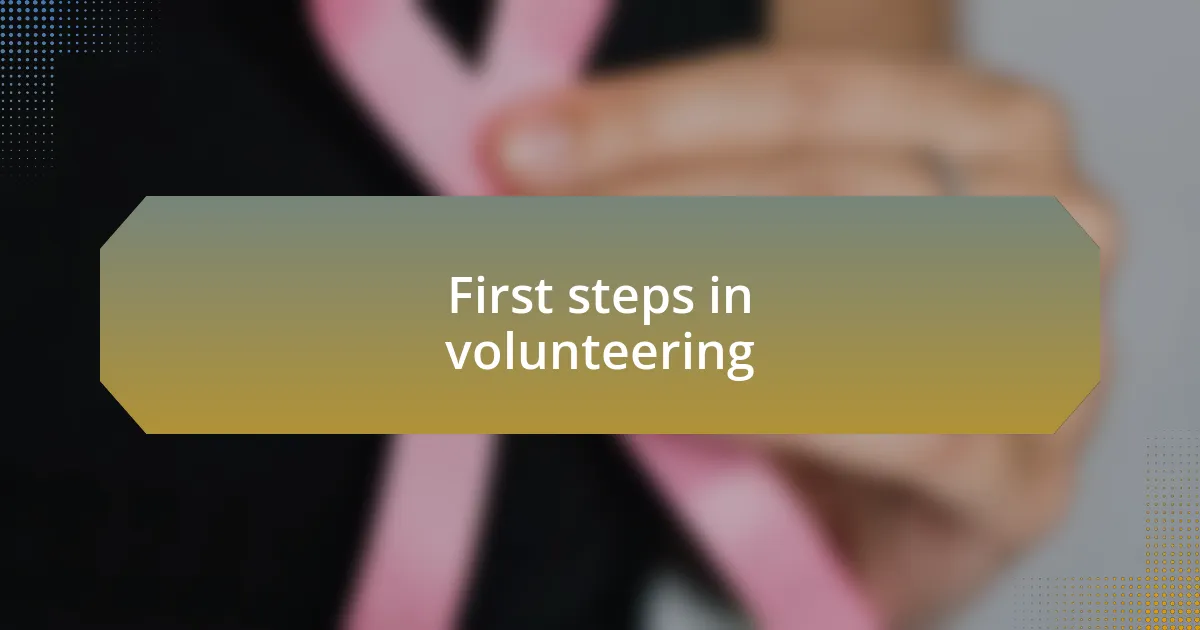
First steps in volunteering
The first steps in volunteering can feel both thrilling and daunting. I remember my own initial hesitation; the idea of stepping into a world so different from my own brought on a mix of excitement and anxiety. It’s essential to start small—perhaps attending an orientation session or participating in a one-time event to gauge your comfort level and see how you can contribute. Have you ever thought about how those first moments of stepping outside your comfort zone can be transformative?
As I dove into volunteering, I quickly realized the importance of connecting with other volunteers. Establishing those relationships made my experience richer and more fulfilling. One night, I struck up a conversation with a fellow volunteer as we sorted donations, and we ended up bonding over our shared passion for helping others. It became clear to me that collaboration doesn’t just multiply our efforts; it cultivates a sense of community that’s vital in the face of such challenging issues.
Taking on responsibilities, even minor ones, helped build my confidence. I vividly recall my first task of simply handing out meals at a local shelter. The gratitude expressed by those receiving help was hugely motivating and reminded me of the meaningful impact we can have, even in small ways. How profound it is to think that a simple act of kindness can ignite hope in someone’s life!
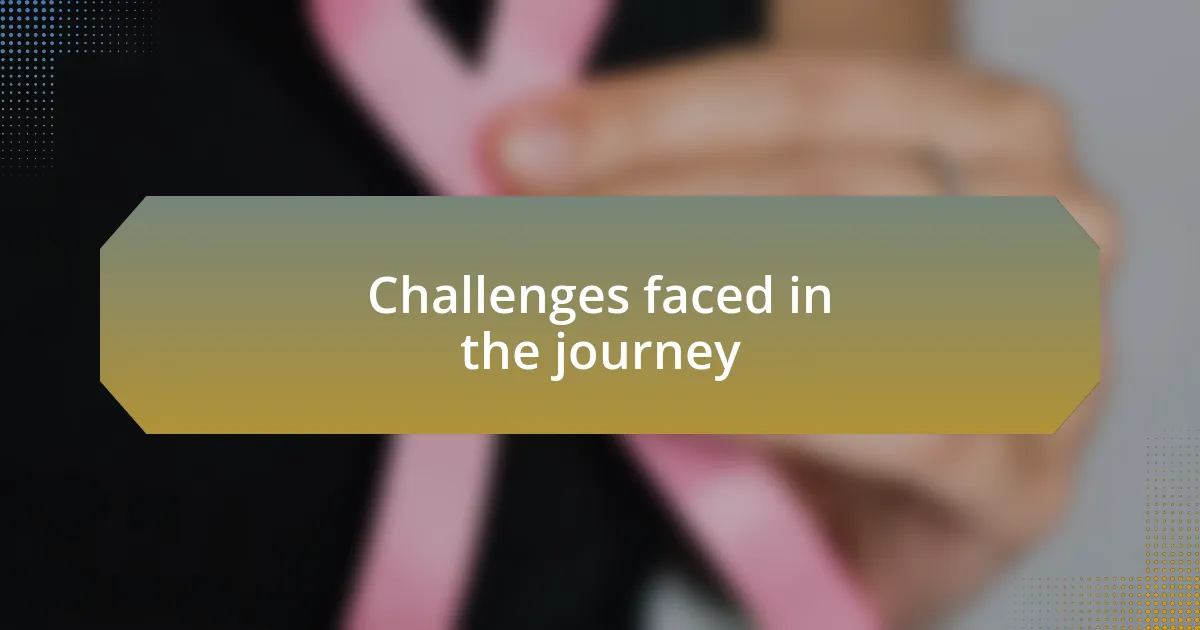
Challenges faced in the journey
Volunteering with a local charity certainly comes with its share of challenges. I remember one particular incident when we ran out of supplies during a community meal event. The look of disappointment on people’s faces was heart-wrenching. How do you explain to someone that help is coming but the wait is longer than expected? That moment taught me the reality of resource scarcity in these situations and how crucial it is to plan effectively.
Another challenge I faced was the emotional toll that witnessing homelessness can have. Each story shared by those seeking assistance resonated deeply within me, leaving an imprint on my heart. I often found myself grappling with mixed emotions—hope for their resilience and sadness for their struggles. Have you ever felt overwhelmed by the weight of others’ burdens? It’s important to remember that even as we provide help, we have to take care of our own mental well-being.
Sometimes, it felt like I was just one person struggling against a seemingly insurmountable problem. I’ll never forget a day when I tried to organize a clothing drive but faced difficulties gathering enough donations. It made me question whether my efforts were truly making an impact. But through these setbacks, I learned that every effort counts, and persistence is key. Isn’t it inspiring how even small victories can pave the way for larger changes over time?
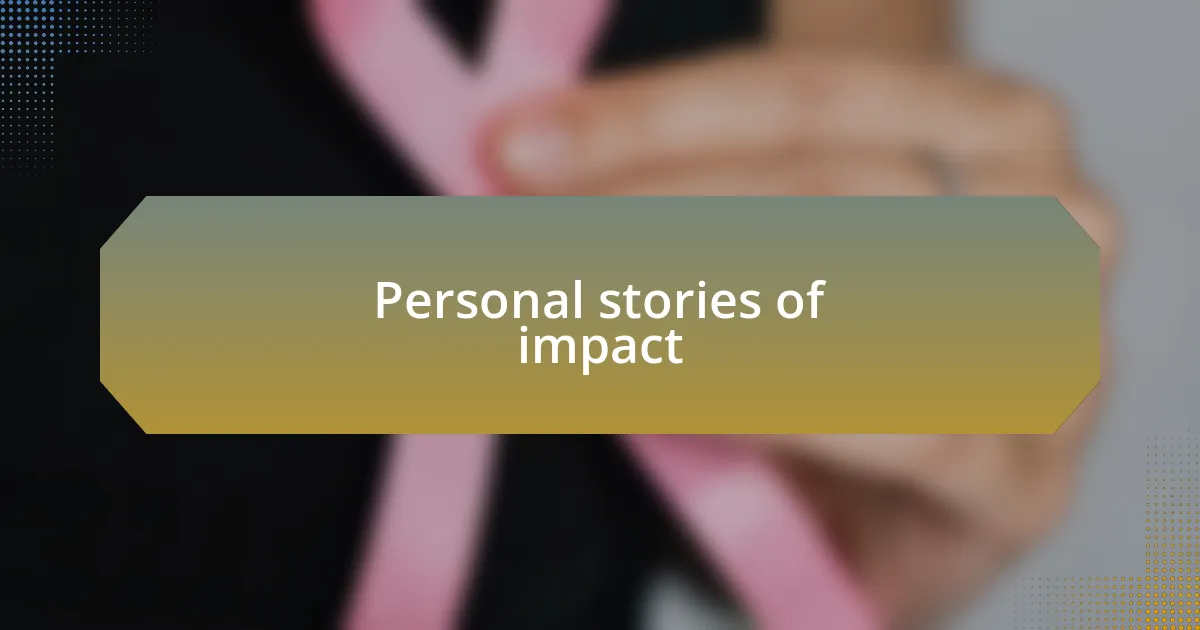
Personal stories of impact
It’s amazing how a single interaction can change your perspective entirely. I remember meeting a young mother in crisis at one of our outreach events. Her eyes were filled with fear as she explained her situation, but when I handed her a care package, her face lit up with hope. In that moment, I realized the power of connection—helping someone feel valued can be as impactful as providing basic necessities.
One day, while volunteering at a local shelter, I sat down with an elderly gentleman who shared his story of losing his home after being unable to afford rising rents. What struck me was his resilience; he spoke of his dreams and aspirations despite his circumstances. Listening to his hopes made me reflect: How often do we overlook the dreams of those in need? This encounter reminded me that beneath the hardships, there are individuals with aspirations waiting for their stories to be heard.
I’ll never forget the moment we celebrated a participant’s birthday during one of our community events. We had gathered simple decorations, but the joy on her face as we sang was priceless. It made me think about the significance of small gestures; they can create lasting memories and a sense of community. Have you ever noticed how little things like a birthday celebration can bring people together? It reinforced my belief that while tackling homelessness is a significant challenge, nurturing human connections is where the true impact lies.
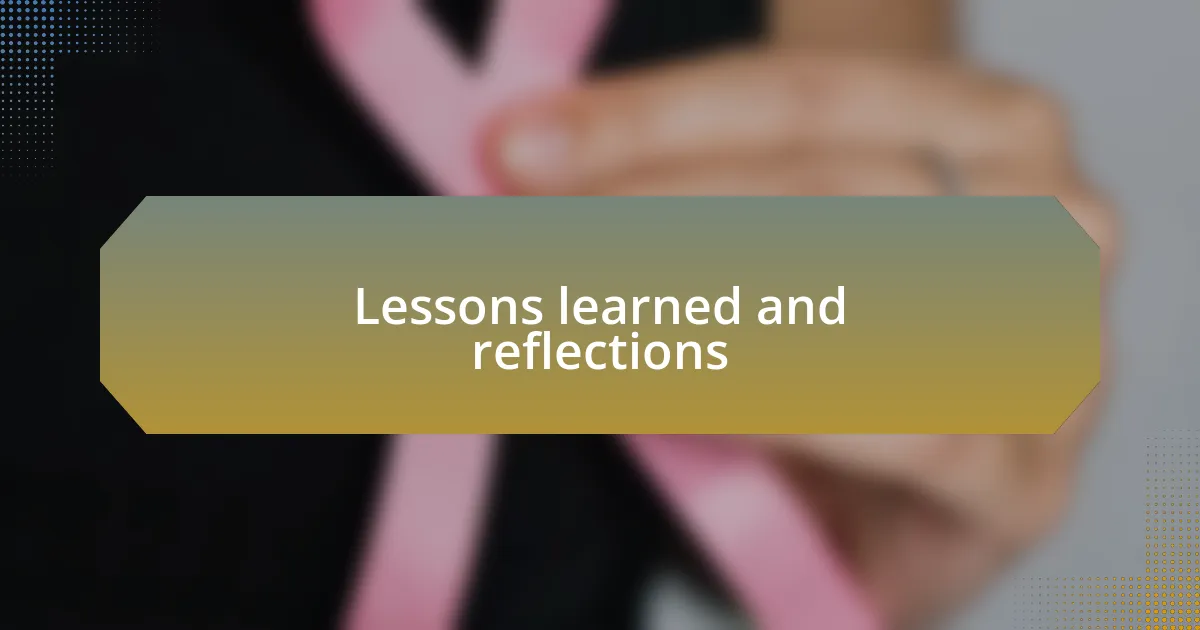
Lessons learned and reflections
Through my journey, I’ve discovered that compassion does not always come in grand gestures. One cold evening, while sharing a meal at the shelter, I found myself sitting next to a young artist. As we chatted, I learned how he had lost his studio and belongings in a fire. His passion for art persisted despite his circumstances, and it struck me: how often do we neglect the hopes of those around us? This experience taught me that everyone carries a story worth telling, and it’s crucial we actively listen to those stories if we want to foster real change.
Another lesson emerged during a conversation I had with a volunteer coordinator. She shared how burnout can creep up on those dedicated to service. I could relate, as there have been days when I felt drained and overwhelmed. It made me think: how can we balance our passion for helping others with our own self-care? This reflection reinforced the idea that we must prioritize our well-being to continue making an impact. It’s a delicate dance between giving and preserving our own energy.
I’ve also learned that each person we help can teach us something valuable. I once worked alongside a former homeless man who now dedicates his life to outreach. His insights on resilience and the importance of community support were eye-opening. How often do we overlook the wisdom of those who have lived the experiences we aim to assist? This reminded me that genuine progress comes from collaboration and understanding, where everyone’s voice is significant.